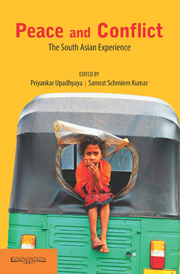Book contents
- Frontmatter
- Contents
- Foreword
- Preface
- Introduction
- 1 Conflict Resolution and Peacebuilding: Ideas, Approaches and Debates
- 2 Changing Perspectives on Peace Studies in South Asia
- 3 Peace Pedagogies in South Asia: Interreligious Understanding
- 4 Responses of Communities to Social Tension
- 5 Plurality of Peace, Non-violence and Peace Works in India
- 6 Education and Culture of Peace: Engaging with Gandhi
- 7 Structural Violence and Human Security: Gandhi's Visions
- 8 Women and the Peace Process in Nepal
- 9 Quest for Peace and Justice in Pakistan: Lawyers' Non-violent Resistance
- 10 Antinomies of Democracy and Peace in Nepal
- 11 Post-armed Conflict Trajectories in Sri Lanka
- 12 Environmental Security and Conflict in Bangladesh: Nature, Complexities and Policies
- Contributors
- Bibliography
- Index
9 - Quest for Peace and Justice in Pakistan: Lawyers' Non-violent Resistance
Published online by Cambridge University Press: 05 October 2014
- Frontmatter
- Contents
- Foreword
- Preface
- Introduction
- 1 Conflict Resolution and Peacebuilding: Ideas, Approaches and Debates
- 2 Changing Perspectives on Peace Studies in South Asia
- 3 Peace Pedagogies in South Asia: Interreligious Understanding
- 4 Responses of Communities to Social Tension
- 5 Plurality of Peace, Non-violence and Peace Works in India
- 6 Education and Culture of Peace: Engaging with Gandhi
- 7 Structural Violence and Human Security: Gandhi's Visions
- 8 Women and the Peace Process in Nepal
- 9 Quest for Peace and Justice in Pakistan: Lawyers' Non-violent Resistance
- 10 Antinomies of Democracy and Peace in Nepal
- 11 Post-armed Conflict Trajectories in Sri Lanka
- 12 Environmental Security and Conflict in Bangladesh: Nature, Complexities and Policies
- Contributors
- Bibliography
- Index
Summary
Introduction
This chapter outlines the long quest for peace and justice in Pakistan. It builds on the successful Lawyers' Movement launched in March 2007. This civil resistance successfully reinstated, in March 2009, the Chief Justice of Pakistan, Iftikhar Muhammad Chaudhry, who had been forcibly removed from office by General Parvez Musharraf in 2007. The movement was a remarkable instance of peaceful civil resistance against an entrenched military regime. The lawyers gave astonishing support to Chief Justice Chaudhry, who used the law to promote justice, in the years during Musharraf's military dictatorship. This ‘Black Revolution’ engaged people across gender, racial, ethnic and ideological affiliations throughout the country. The movement lasted two years, eventually achieving its goal of re-instating Chaudhry as Chief Justice and bringing down the dictatorship. It does however leave unanswered questions on whether these types of movements always promote peace and democracy in a society when they are heavily laden with their own professional interests.
Violence has been one of the basic expressions of Pakistan's politics since its emergence amidst a bloody sub-continental partition. Its protracted conflicts with India, along with the surge of Islamic fundamentalism and sectarian conflicts, served as fuel for violent insurgent elements. The democratic impulse remained overshadowed by the important role of the military in governance. Pakistan’s multifaceted involvement in Afghanistan’s upheavals and its uneasy nexus with the American alliance, first as the ‘frontline’ state against Soviet occupation, and more recently against Taliban forces, has only exacerbated the level of coercion and violence in its polity. There was indeed limited scope of non-violent resistance amidst such violent upheavals and political instability.
- Type
- Chapter
- Information
- Peace and ConflictThe South Asian Experience, pp. 160 - 176Publisher: Foundation BooksPrint publication year: 2014



